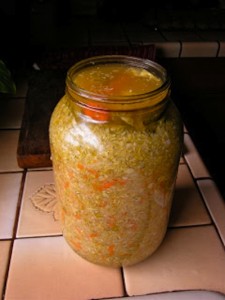 Culturing (aka: fermenting) vegetables has long been a tradition meant to extend the shelf-life of fresh summertime produce throughout the winter months. In our modern world, we don’t experience this particular dilemma much. But so much has been recently discovered about the health benefits of eating live-cultured (probiotic-rich) foods which are brimming with beneficial bacteria (about 100 times more than probiotic supplements!), that many people are now beginning to culture their own veggies at home.
Culturing (aka: fermenting) vegetables has long been a tradition meant to extend the shelf-life of fresh summertime produce throughout the winter months. In our modern world, we don’t experience this particular dilemma much. But so much has been recently discovered about the health benefits of eating live-cultured (probiotic-rich) foods which are brimming with beneficial bacteria (about 100 times more than probiotic supplements!), that many people are now beginning to culture their own veggies at home.
Making your own cultured veggies like sauerkraut, kimchee, or beet kvaas, is a great, inexpensive way to re-establish a healthy population of beneficial bacteria. I say ‘re-establish’, because in our toxic, modern world, our natural bodily populations of beneficial bacteria get significantly knocked down by: the use of antibiotics (prescribed AND residual amounts in commercially produced animal products), corticosteroids, birth control pills, chlorine in tap water, heavily cooked meat, preservatives in processed foods, refined sugars, hydrogenated fats and oils, toxins in our food and environment, and stress.
The wonderful little vitality-givers should actually cover our skin, swim in our blood, and colonize our intestines and vaginal tracts. Some scientists say that we are ideally 90% bacteria, and only 10% human! Wow! That’s a really weird thought! But beneficial bacteria help our bodies to thrive on multiple levels. Aside from helping our bodies to better digest and assimilate food nutrients, they act as the foundation of our immune systems, they help lower blood pressure, they keep bad bacteria and yeasts in check, they contribute significantly to healthy skin, AND they work to help normalize our metabolism and thusly our weight. Oh! They also produce both vitamin B12 and K2 in our intestines. Wow, right?
As if all these various benefits of probiotics aren’t enough, here are more findings via Dr. Joseph Mercola:
“Many fail to realize that your gut is literally your second brain, and can significantly influence your mind, mood, and behavior….mounting evidence indicates that ignoring your gut may have far-reaching psychological consequences, and it’s becoming increasingly clear that nourishing your gut flora through proper diet, from cradle to grave, is extremely important for proper brain function, and that includes psychological well-being and mood control.
“This mysterious connection becomes easier to grasp when you understand that your brain and your gut are actually biologically identical, as they’re created out of the same type of tissue. These two systems are connected via the vagus nerve, the tenth cranial nerve that runs from your brain stem down to your abdomen. The featured research, published in the August 29 issue of Proceedings of the National Academy of Sciences, confirms that the vagus nerve is indeed the primary route your gut bacteria use to transmit information to your brain.”
There are even more amazing new findings on how probiotics influence our continued genetic expression. Dr. Joseph Mercola has explained this in another recent article. He says, “One of the most cutting-edge fields of medicine is epigenetics, which has shown that your lifestyle plays a significant role in how your genes are expressed. Probiotics influence the activity of hundreds of your genes, helping them to express in a positive, disease-fighting manner. The widely accepted dogma that your genes control your health destiny is now being completely uprooted, as your genetic code is not set in stone. Rather it is constantly changing based on factors like your diet and stress levels. To put it simply, the more dietary and lifestyle habits you engage in that positively influence your genetic expression, the more protection you’ll naturally receive against a host of chronic illnesses. For instance, eating broccoli and other cruciferous vegetables, garlic and onions helps to activate tumor suppressor genes that fight cancer. Likewise, researchers revealed that eating probiotic-rich foods influenced the activity of hundreds of human genes in a positive manner.”
We can start to take advantage of epigenetics by incorporating probiotic-rich foods into our diets such as raw sauerkraut, kimchee, beet kvaas, miso, kefir, yogurt, kombucha, etc. Cultured foods should always be raw or unpasteurized, refrigerated, and never cooked or heated to boiling, so that the good bacteria are kept alive. I prefer making my own cultured veggies rather than buying a probiotic supplement, not just because it’s way less expensive, but because, as I said before, cultured veggies contain about 100 times the amount of probiotic bacteria than probiotic supplements. Also, the sour flavor satisfies the third taste according to both Ayurveda and Macrobiotics. So, if a meal contains all 5 tastes (sweet, salty, sour, bitter, and pungent), we’ll feel more satisfied and have less of a tendency to overeat.
Making your own sauerkraut can be tricky, but it’s very satisfying. The first time I made a batch of sauerkraut that actually turned out, I felt triumphant. The weeks of waiting had finally proven worthwhile. And, I realized that I was connecting to my ancestors by going through the motions they had gone through for so many hundreds of years.
Showing people what I’ve learned over the past 15 years about the art of culturing vegetables is very gratifying. I know I’m sharing a hugely health-promoting practice which they and their friends and family will definitely benefit from.
Much content for this article came from Dr. Mercola, a New York Times bestselling author. For more helpful articles, please visit Mercola.com today and receive your FREE Take Control of Your Health E-book!
